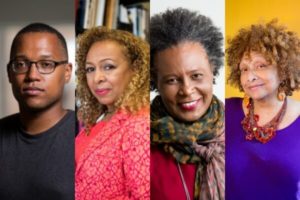
Branden Jacobs-Jenkins, Kellie Jones, Claudia Rankine and Joyce J. Scott (John D. & Catherine T. MacArthur Foundation)
The MacArthur Foundation announced their newest set of grant recipients, known as geniuses, on Thursday.
And it counts four Black honorees among them.
Branden Jacobs-Jenkins, Kellie Jones, Claudia Rankine and Joyce J. Scott each earned the six-figure grant because of their “extraordinary originality and dedication in their creative pursuits.”
According to the foundation’s website, they award a $625,000 stipend to each of the 23 total geniuses. Jacobs-Jenkins, Jones, Rankine and Scott will use that money to fund future advances in their individual areas of emphasis.
A 31-year-old playwright from New York City, Jacobs-Jenkins uses current and historical theatre genres to comment on issues like race and identity. For example, 2010’s Neighbors featured performances akin to minstrel shows of the past. It included actors in blackface.
Jacobs-Jenkins told The Washington Post the hefty grant will give him time “to do the work I really want to be doing.”
Rankine is similarly aiming to create work that helps show the living experience of today. According to the MacArthur website, the 53-year-old poet uses her skill to describe the “emotional and psychic tensions” of society. In 2014’s “Citizen,” she used poetry to convey the everyday racism against African-Americans.
“I recorded all of the CNN coverage [of Hurricane Katrina] and was fascinated by how racism colored the reporting,” she told the foundation of her book. “After that, I began to respond to events that caught the public imagination. Mostly things like police shooting of unarmed Black men.”
A jewelry maker and sculptor, 67-year-old Scott’s work also spotlights racism. Her exquisite crafts reveal stark representations of the issue. One example is the self-descriptive Lynched Tree. Another, Thunder Thigh Revue, tackles the stereotypes placed on Black women’s bodies.
Scott told The Post the grant will give her the chance to mentor younger artists.
“All of the skills that people have given me, I’ll be able to share,” she said. “I’ve come to see this fellowship as a fantasy room of all whiteboards; I get to go in, and not just play with the ideas, but then actually bring them off the wall and into life.”
Like Scott, Jones is also familiar with sculpture. An art historian and curator, she is credited with “deepening our understanding of contemporary art of the African Diaspora,” according to the MacArthur site.
In doing so, Jones also secured the works’ place in the current art world. Her exhibition, Energy/Experimentation: Black Artists and Abstraction, 1964–1980 highlighted Black abstract painters and sculptors.
While 57-year-old Jones spoke to the Wall Street Journal, she said she was inspired by artists like Melvin Edwards and Senga Nengudi – who explored racial tensions through sculpture.
“They were like the Mayans or the Egyptians,” she said of Edwards and Nengudi, who faced adversity. “If they never gave up, why should I?”


